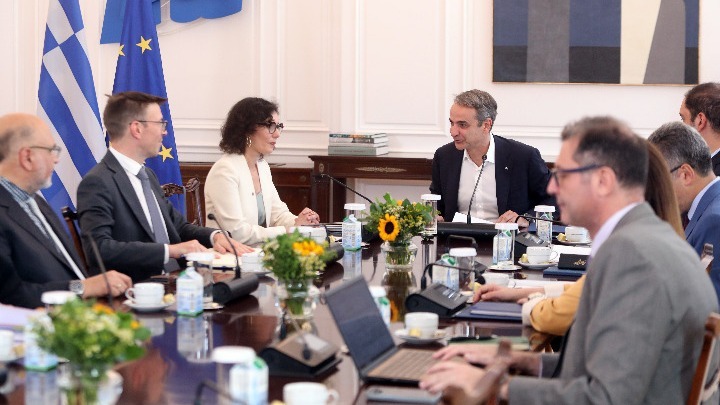PM Mitsotakis meets with European Commissioner for Equality, Preparedness and Crisis Management, Hadja Lahbib

Prime Minister Kyriakos Mitsotakis met on Friday with European Commissioner for Equality, Preparedness and Crisis Management, Hadja Lahbib, at the Maximos Mansion.
Welcoming the Commissioner, Mitsotakis stated: "Since 2019, strengthening civil protection and the preparedness mechanism has been a top priority for our government. As you know, we now have a dedicated ministry and minister responsible for this portfolio. As a country greatly affected by the climate crisis, we see this as an essential investment."
The prime minister also noted his appreciation for the presence of prepositioned firefighters from European countries in Greece every summer: "We hope they will only be here for a vacation but, if needed, they are ready to assist." He also added that "just a few days ago, we mobilised some of our friends from Moldova to help with a wildfire in Northern Greece-a truly excellent example of European solidarity."
Among others, Mitsotakis noted that has faced natural disasters in the past that led to a "tragic and unnecessary loss of human lives," so that strengthening civil protection and preparedness has been a top priority for the government since 2019.
While welcoming initiatives of European solidarity, the prime minister also stressed that as the European Union, "when it comes to our overall response to the climate crisis, we must begin to place greater focus on adaptation."
"I wouldn’t say less focus on mitigation, because that remains critical, but we must focus more on adaptation, because the climate crisis is already here. It is a reality. Temperatures will rise. We will face more wildfires. We will see more extreme weather events. This is a reality we must not only prepare for, but also be fully ready to confront in the best possible way," he said.
"One final point I would like to raise, which is very important for us, concerns the use of technology. In our case, the drone surveillance system has proven to be absolutely critical for the early detection of wildfires, enabling a faster and more effective response-something that makes a significant difference. Equally important is the way we are using technology and artificial intelligence to predict weather conditions. This is vital: forecasting the behaviour of wildfires. By leveraging satellite data, the Copernicus system is a service we, as Europeans, should be very proud of.
"Therefore, technology, especially when it comes to localised weather prediction, could form the basis for a European platform-and it should be a European project. This is especially true in cases like floods, where such capabilities can be game-changing," Mitsotakis emphasised.
On her part, Lahbib thanked Mitsotakis for the warm welcome, adding that she is very impressed with everything she has seen. Noting that the risk landscape is only changing for the worse, she stressed that the EU must be prepared, which was why the Commission presented the Preparedness Strategy on March 26.
"Two days ago, we adopted a very ambitious budget. Funding was increased because we need to respond, to develop, as you rightly said, technologies. We need to invest in research and development. It is crucial to be prepared in order to prevent the next pandemic. All scientists say it will happen, we just don’t know when," she said, noting that strong medical countermeasure strategies were needed to avoid a repetition of what happened with Covid.
She also pointed out the increasing risk of hybrid attacks and cyberattacks: "I visited Sweden, where there is a very clear understanding that the greatest threat is not forest fires, but hybrid attacks and cyberattacks, and perhaps also the instrumentalisation of migration, and so on. We must have a comprehensive strategy. That is exactly what we are doing with this new Preparedness Strategy. I hope to secure your support, because indeed, we adopted a very ambitious budget of 10.7 billion euros allocated to the comprehensive Preparedness Strategy. It is therefore important that we have the support of the European Council."
Lahbib said there will also be a discussion on how to adapt civil protection rules to better respond to complex crises with cascading effects, where one crisis leads to another, noting that there is greater flexibility in the new Multiannual Financial Framework "because we need both more resources and greater agility to respond to the various scenarios and risks we are likely to face. It is better to be prepared in advance than to finance recovery afterward. It is a smart investment."
The Commissioner also referred to issues relating to humanitarian aid, noting that it relates to the root causes of migration, in places such as Sudan and Gaza.
"We have just reached an agreement which we presented at the Foreign Affairs Council. I briefed the ministers on the current status of the agreement with Israel regarding access to humanitarian aid. This agreement is a step in the right direction, but it is far from being implemented and must be put into effect immediately. We will continue to monitor it and provide updates on compliance every two weeks, and Member States will also have to decide what the next steps will be," she said.

















































































